People save up for retirement, but how well do we prepare for the journey after? Ancient cultures put great emphasis on the afterlife, because they knew consciousness continued after death. They were right: Out-of-body experiences reveal we really do exist beyond the body. Knowing this truth should inspire us to seek in life what really matters and remains after death – awakened consciousness.
What is the greatest mystery of life? According to a legendary Q&A in the Indian spiritual epic the Mahabharata, the greatest wonder is that countless people die every day, yet those left behind believe they will live forever.
There is a well-known saying that the only certainty in life is death, but our hyper-connected modern society is not exactly inspiring much reflection on what lies beyond the transient.
People put aside savings for retirement, and some take out life insurance to take care of the loved ones they leave behind. This looks after physical needs, but what about the needs of consciousness which continues without the body? What preparations are made for its journey after death – the ultimate journey of a lifetime?
Religious institutions offer a solution to their followers that usually depends on adopting a set of beliefs rather than personal spiritual discovery. On the other hand, some scientists will tell you with equal conviction that nothing comes after death, so don’t worry about it. Both of these points of view depend on belief, but what if, when the final moment comes, you realise you wasted the great opportunity your life provided? An alternative option is to discover for ourselves why we are here, and what our place in the universe is, while we are alive and have the opportunity to do something with the knowledge we gain.
Ancient spiritual cultures almost universally placed importance on the individual’s preparations and journey into the afterlife. They clearly understood our existence extended beyond our bodies, and that life and death were best seen with the bigger picture of creation in mind – as part of an ongoing journey of consciousness – with life presenting an amazing opportunity for conscious evolution that we take the fruits from after death.
This was bought home to me in an interesting way during a trip to a museum exhibition showcasing ancient Egyptian afterlife cosmology; it reminded me of the universal nature of the afterlife, and how Near-Death Experiences and Out-of-Body Experiences offer us a glimpse into the reality of existence beyond the body, revealing that awakening consciousness is what creation is really all about.
With our modern culture drifting more and more into shallow short-sighted materialism and faux metaphysics, the need to re-discover and live this deeper purpose to life, so cherished by the ancients, is more important than ever.
A Journey into the Ancient Egyptian Afterlife
A while back I was fortunate to have the opportunity to take a one-way self-guided tour through the ancient Egyptian afterlife, thanks to a special museum exhibition featuring artefacts from the British Museum collection.
The local museum was packed, and we had to wait in a queue before being allowed in. Finally we entered a dimly-lit passage thronging with people, winding past ancient Egyptian artefacts, artworks, tools, scriptures, and mummies.
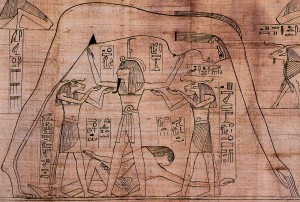
The exhibit started with depictions of ancient Egyptian cosmology like this. Here the sky goddess is held up above the earth.
It was arranged so that you went on an afterlife “journey” vicariously, stage by stage, in the way the ancient Egyptians understood it. It began with displays showing ancient Egyptian depictions of the world’s creation, and culminated with the judgement of the soul and its journey after death. In between you were shown artefacts demonstrating how ancient Egyptians understood and prepared for death.
There were ancient scrolls of the pyramid texts on display, and ancient art depicting the soul’s journey through the afterlife. A major theme in their art was judgement and the “weighing of the heart”, where a deceased person’s heart was weighed against a feather, and their fate was dependent on their inner qualities and the sum of their actions while alive. Toward the end of the exhibition they had a mockup display of this, with a large set of scales on which you could weigh your “heart” against a feather, while Egyptian Gods looked on from a mural.
After that, you passed into a depiction of the Egyptian paradise before stepping outside into the sunlight. I doubt the effect was intentional on the part of the exhibitors, but after passing through the exhibition’s dark passageway with its ordered depictions of the afterlife, judgment and then stepping into the light, I couldn’t help but think of accounts of near-death experiences, in which people often report passing through a dark tunnel toward the light, and experiencing a life review where they see the consequences of all their actions.
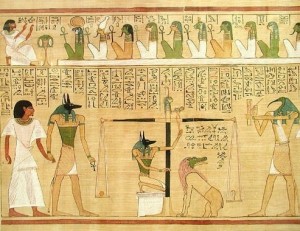
Depiction of the “weighing of the heart”
The exhibit really brought home to me how the ancient Egyptians understood they existed for a purpose that went beyond everyday life. Death was a doorway to the next stage of existence, and their lives were an opportunity to prepare for it. They knew we do not cease to exist when we die, and saw the quest for immortality through awakening consciousness as the real purpose to creation.
From looking at artefacts from different periods, it was apparent the ancient Egyptian understanding of death changed over time. It seemed to me that originally, the emphasis was on living spiritually and obtaining an immortality of the soul, while in later periods their understanding declined into more literal interpretations of preparing the body (rather than consciousness) for the afterlife through mummification, and a preoccupation with the arrangement of one’s burial and tomb with the right spells and amulets.
But I was vividly struck by how through that civilisation’s long and varied existence, the importance of the afterlife always reigned supreme, and being prepared for life after death was absolutely central to existence. Death, and therefore life, was taken very seriously.
I couldn’t help but notice a stark contrast between our modern culture and theirs. It was a bit like being in some kind of time warp, where two very different cultures collided. The artefacts of the Egyptians gave a sense of the sacredness of life and creation, but the bustling, noisy crowds of modern onlookers apparently saw this ancient preoccupation with the afterlife as mere novelty and amusement. How different ancient Egypt was to our modern society where the reality, and inevitability, of death is given little thought or preparation, and the understanding that consciousness continues after death is often summarily discounted and ridiculed.
I highly doubt that many people who attended the exhibition paused to reflect on whether they would continue to exist after death and, if so, how? And why are we here anyway? This was driven home when, just prior to reaching the scales of “judgement”, I noticed a whiteboard, styled with papyrus veneer, with a pertinent question written at the top.
What would you take with you to the afterlife?
Good question. A pen hung from the board, inviting people to write their response underneath. The answers ranged from the sentimental, to the mundane, to the silly.
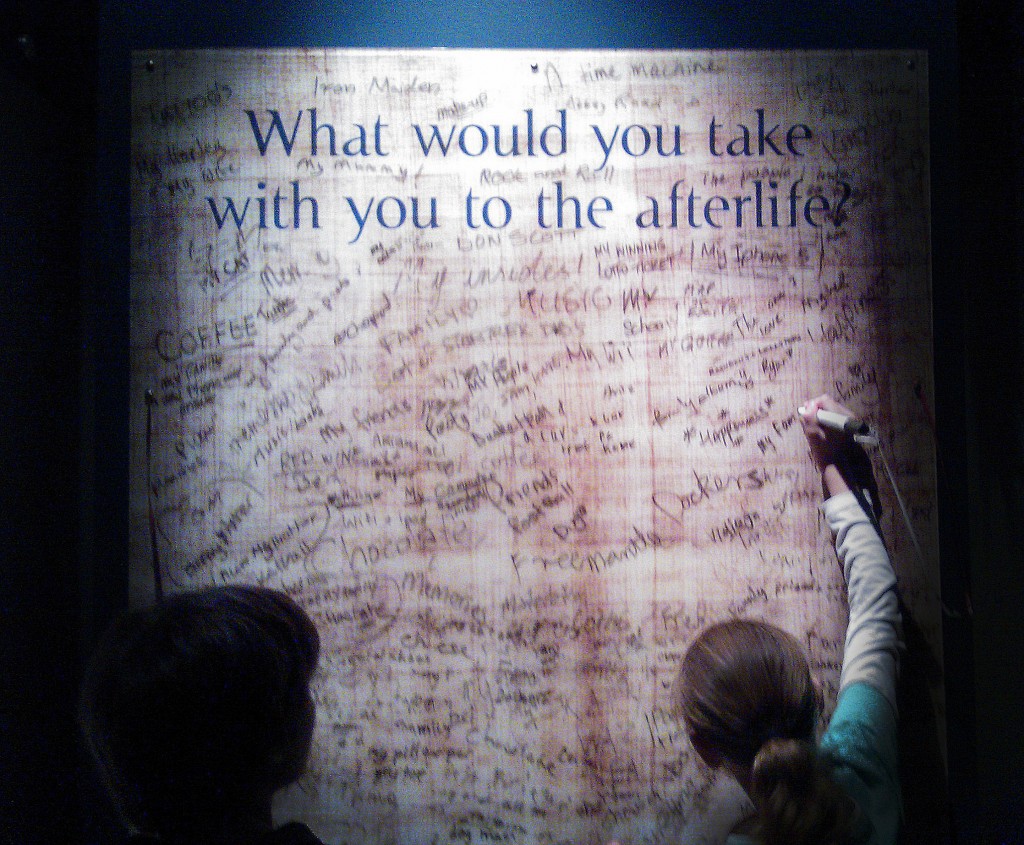
How would you answer the question?
Some wanted to take their friends and family with them, while others wanted to take things like their iPhone, make-up, favourite band, football team, favourite rock star, chocolate, alcohol, and so forth.
A “time machine” was perhaps the only clever response. I could see the benefit of that if you realised you had wasted your life. I don’t think it’s really an option however.
This brought home how we don’t take death and the meaning of our lives anywhere near as seriously as we should today. The ancients knew a lot more about life and death than we do. We have lost their ancient wisdom, and with it the understanding of the amazing opportunity our existence in this universe presents.
This is a serious problem. Our consciousness will continue to exist without the body. But if we don’t question our existence and why we are here, we will not awaken consciousness and we will never reach our true potential.
Near-Death Experiences and the Reality of Existence Beyond the Body
Existence after death is not something the ancient Egyptians invented. Concepts of an afterlife are so common across geographically isolated cultures around the world that it cannot simply be dismissed as a coincidence. There may be cultural differences in the details, but the understanding that we continue existing without the body has been pretty much universal for thousands of years.
In fact, the burial of the dead and the realisation of an afterlife are considered some of the most important hallmarks of cultural development in Stone Age people. It was a sign of intelligence distinguishing people from animals, and paved the way for the development of more sophisticated civilisations.
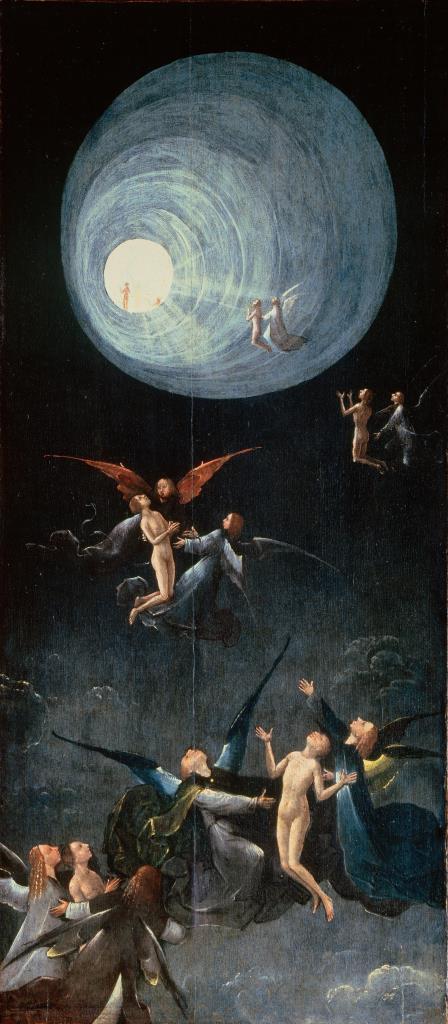
The medieval painting ‘Ascent of the Blessed’ by Hieronymus Bosch shows the light at the end of the tunnel common to NDE accounts
Near-Death Experiences (NDEs) provide compelling anecdotal evidence that the afterlife mythologies of the world share a real common source and that consciousness exists beyond the brain. In NDEs, people who are clinically dead or close to death go through experiences that follow a pattern with universal traits, which they recall after being revived.
These include an out of body experience, where they leave their body and realise they are separate from it, perhaps seeing their body lying beneath them. Then they may go on a journey, which may feature common aspects like travelling through a tunnel, and a life review, where a person is shown everything they have done, and feels the effects of their actions toward others, whether good or bad.
Although some scientists speculate that these phenomena may be caused by the brain, the reality is that these experiences have occurred when patients are clinically brain dead, and it has not been proven these experiences are produced biologically. Furthermore, there is no ultimate proof that consciousness is produced by the brain anyway, although this is a strongly-held assumption among those entrenched in materialistic beliefs.
NDEs challenge rigid materialistic beliefs about life. In light of the prevalence and commonality of NDEs, some scientists now suggest that consciousness interacts with the brain rather than being produced by it. Rather, the brain is a conduit through which consciousness can express itself, much like the way a computer is a conduit for the internet, but the internet continues to exist when the computer is switched off.
NDEs are increasingly reported in the modern world due to improvements in health care leading to more people being revived, but they are also an ancient phenomenon. Research by the scholar Gregory Shushan found there are universal afterlife experiences which underpinned both modern NDE accounts and ancient afterlife mythologies. His research involved an in-depth comparative analysis of afterlife conceptions of five ancient civilisations (Old and Middle Kingdom Egypt, Sumerian and Old Babylonian Mesopotamia, Vedic India, pre-Buddhist China, and pre-Columbian Mesoamerica) and compared them to modern NDE accounts. He demonstrated that, although there were some variations in the details based on the cultural origin, there were specific recurring similarities that reappeared too consistently to be mere coincidence, suggesting that, “afterlife conceptions are not entirely culturally-determined and… appear to be universal or quasi-universal to some degree”.
Life is an Opportunity to Awaken Consciousness
Realising that you are consciousness, and continue to exist without the body, awakens you to the bigger picture of life. It puts your whole life in perspective.
In an NDE life review, people tend to see that what really matters in life is not how much money they made or what they achieved in a given field, but how they treated other people, and whether they acted with love. These experiences tend to change people’s lives, inspiring them to be more spiritual.
We do not need to have an NDE to verify that we exist without the body, or to have life-changing experiences. Through astral projection, we can have wilful out of body experiences and use these mystical experiences to learn about ourselves and make positive changes in our lives.
Realising that we exist beyond the body can open the door to awakening. You realise that what really matters in life is not what we gain physically, but developing consciousness. Then the question, “what will you take with you to the afterlife” becomes much more meaningful. You can’t take physical things with you when you die like your iPhone, but you can take consciousness. Then you see that the focus on the afterlife in ancient cultures was not a preoccupation with death, but a deep understanding of life, and how to live it in the most meaningful way to bring spiritual benefits to yourself and others, the effects of which continue after death.
States like anger, greed and hatred have their consequences in the world which are bad enough, but who wants to take these states with them to afterlife? If these states don’t bring happiness here, why drag them along after death? Expressions of consciousness like love, wisdom and inner peace are much better qualities to carry within. By awakening and expressing consciousness in a world filled with ignorance, hatred and darkness, we not only help to make the world a better place, but continue to carry these spiritual qualities in our consciousness when our body is left behind.
Understanding this is so important today. We live in a society bombarded with elite-controlled propaganda and entertainment that not only hides the darker agendas working in the world, but blankets people in ignorance, keeping us from uncovering the deeper potential of our consciousness and empowering ourselves by striving to awaken – which enables us to break free of the grip of darkness that exerts its influence over humanity. Failing to wake up to this agenda has it implications in the world, and also for our consciousness, and it’s consciousness that really counts, both in life and beyond.
So what would you take with you to the afterlife?
 The Conscious Reporter Examining the issues agendas and forces driving spiritual suppression
The Conscious Reporter Examining the issues agendas and forces driving spiritual suppression
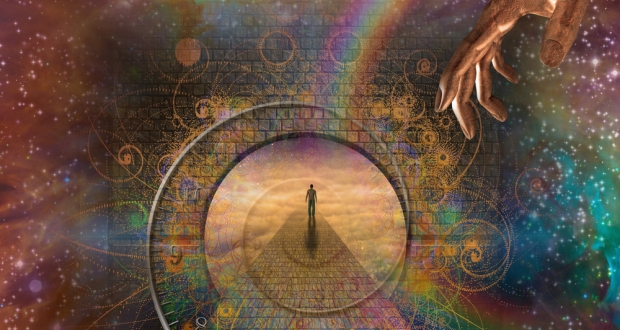

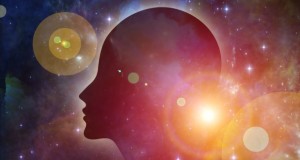

Very well written i like this article so much.
ps it helped me alot.
me too.
people who see ghosts many times they describe what the ghost was wearing, usually the last thing they were wearing
I wonder if you were dying, could you ‘dress up’ like the vikings – items to make your journey easier?
Great post! I like that you give life after death some attention, obviously the life we’re living now if front and center, but it’s all too easy to forget that we have yet another incredible world (or worlds) to wake up to after this one. Nicely written!
That was a very thoughtful and well-done article. I hope you get good coverage for it. I intend to mention your article in my next free monthly newsletter, which I publish through http://www.pmhatwater.com. Anyone can subscribe. I’ve been researching near-death states since 1978. That makes me one of the original in the field. I’ve written 11 books on my findings, from a research base of 4,000 child and adult experiencers. When talking about near-death experiences, also mention the pattern of physiological and psychological aftereffects. Most people forget to do that, yet it the aftereffects that validate the experience, not the other way around. Once you study the phenomenon (experience and aftereffects) you begin to realize the experience covers far more than any travel through the afterlife. It tends to change a person’s body as well as one’s mind and emotions. This dynamic causes us to revamp, even reconsider, the effect of such transformations of consciousness – a much larger genre than first thought. Actually, when you study all the material, you come to realize near-death states say more about life than they do death – and what they reveal is stunning!!! My latest book just came out: “Dying to Know You: Proof of God in the Near-Death Experience.” This one is small, but power-packed – directed toward all the big questions. Blessings, PMH
Hi Drwis. P.M.H Atwater,
Really cool to see you here. I have seen several of your videos recounting your NDEs and they seemed to be amazing experiences. I have also come across research on the effects of NDEs on people and as you were saying, the impact it has on people is lasting, so are the clarified of the experience which does not disappear after time are actually 2 main reasons which validates the experiences in terms of simple but pure psychology.. so to speak, a psychedelic or drug induced state will not have the same effect as an NDE. Yet there is a lot of misconception and disinformation on NDEs and I was wondering if you had feedback in that.
Best wishes
Hi Dr. P. M. H. Atwater,
Thanks for dropping by. You have done a substantial amount of research on NDEs which has helped to shed light on this phenomenon, so I really appreciate you sharing your thoughts on the subject here. I’ll be sure to have a closer look at some of your work.
You make a really good point about the powerful aftereffects of NDEs. I have certainly seen the impacts you are talking about on someone close to me who had an experience.
Thanks for including my article in your next monthly newsletter — I’ve subscribed and I look forward to seeing it. Best wishes to you.
Life unfolds for each of us in its own way. Let’s not presume to know what another’s path should be or is.
I have read many of your articles and found many important issues raised regarding spirituality and it’s inspiring. However, the whole issue of ‘awakening consciousness’ seems vague and unintelligible.
I’ve realized that many of the articles posted on this website is concerned on freedom of consciousness, but what does that mean? Is it just being aware of the current issues and try solving it in our own way, or is there something more?
I have had OB experiences and so did many people I know, but something is fundamentally lacking. Why is our current humanity so unaware of this side? Who writes sacred-texts anymore.
I feel people are so apathetic to the point of trying to obscure their existence by drowning in material pleasures. and it hurts to see so many suffer from it.
Hi Only Sound, I’m glad you have found this site inspiring.
Freedom of consciousness is really about protecting the freedom to explore spirituality and consciousness in society — myself and others write about issues and agendas that limit our ability to do this. So this site is not really about telling people how to awaken consciousness; there are a diversity of spiritual viewpoints out there and however someone wishes to pursue spirituality is up to them. But we all have an interest in protecting our ability to explore spirituality/consciousness by the route we choose, including through alternative forms of spirituality, and it is important to uphold this right for everyone and show what it is limiting it in the world, regardless of any differences people may have in how they personally view or approach spirituality.
Thank you so much for this article Matthew! So very much needed in this world… I wish everyone could read it. But then, I also know they may not really grasp it. I noticed there are many people today, who for example try to be good and loving, help others and especially center their lives around family life and its values. They can’t see anything more noble than that, and the pursuit of mystical experiences sounds a bit suspicious and strange to them. They think somehow like this: “Ok, I try my best to be a good example, help wherever I can, hold family together and reject evils in TV and everywhere, etc.” They may even be actively pointing out the dangers of Illuminati, pharmaceutic industry and such, and yet, when it comes to mystical experience they remain suspicious about it, as if it was some sort of threat to their lives and values. As if mystical experiences and glimpses of the world beyond physical body was not “safe” and not really needed either. They say things like “all we need is here, we need to work with what is here in the physical world, and not to go into those strange experiences”. And indeed, the mass media are only full of the examples of “dangerous sects” that support this type of thinking.
This makes me very sad as i know so many intelligent and inquisitive people who are really good friends, mothers and so on, and yet, when it comes to a mystical experience they refuse it as something either suspicious, or something they simply don’t have a time for right now… This leaves me with a question of how to communicate this need in such a lapidary way that everyone would get it? How to make mystical experiences, astral projection and esoteric self-discovery more “normal sounding”? If in ancient cultures, it could be the mainstream preoccupation for everyone and their connection to spiritual realms was so strong, why not today? I understand that we lost some of the faculties since then, and therefore can’t feel things very well anymore, but why even a wish to know those realms has seemingly disappeared or has been vilified?
Sorry for a somewhat long post, these are just some questions that your article brought up. It would be nice to know what other people think too, or what are their experiences when trying to communicate or talk about these things to people they know.
Thank you again for this writing. The Egypt exhibition you attended also sounds like a very touching experience. I wish there were more of these happening all around, at least it gets people talking about these things.
I have seen what you say Lucia too. In the begging looks sad and feel pity when people don’t care, deny, reject the obvious. But there is always a phycological reason behind it that if we knew it we could understand their attitude and possibly feel compassion. For example the denial is a defending mechanism in human phycology which works almost automatically infront of the unknown like a first OBE.
On one hand, I have the belief that there is always a way someone or something to trigger deeper chords inside a person and make it more positive, open minded and receiving. Probably a kind of vibration that could break some blocks inside a person. Or a long phyco-therapy, or through pain(accident, death, illness).
On the other hand every person is special and has been formed in a certain way. Its one of us according our formation we are looking for certain experiences to live like have family, become rich, live extreme, invent things etc
But when someone sate the materialistic kind of experiences will probably look for some more delicate ones in order to fill the gap inside. And this can take long time… or maybe not.
Thank you Matthew for bringing up this topic! It triggers a lot of reflection and dicussion.
Our modern society is so far removed from the ancients. Whenever I look at the ancient Egyptian art and read their texts, it becomes very clear.
What people were writing on that board sums it up exactly! It’s like people don’t take life and death seriously.
Very cool article Matthew thanks!
Sounds like a really cool museum tour! I had the privilege of going to Egypt in January. I was inspired to go as I have always been drawn to the art since I was young, and also I have had a number of out of body experiences involving figures from ancient Egypt.
Even though the structures are not used as they were and are severely run-down in a lot of cases. The place still has a strong mystical feel. It was kinda sad seeing how people treated the artifacts and sites, just wanting to quickly rush in, take photos, and move to the next thing (one less thing on my bucket list kinda mentality), even the tour guides were very rushed and tried to herd our group through everything as quickly as possible. (When we went to the pyramids they even convinced the rest of the group to not bother entering the great pyramid, and only go in the middle pyramid, as its basically the same as the great pyramid and not as much of a climb!!! I could not believe it, you came all the way to Egypt and you have the chance to go in the great pyramid and you couldn’t be bothered!!! I am glad I went in, the King’s Chamber has a strong mystical feel and if only those walls could talk. lol).
I was always holding up the group as I was trying to take things in much more, and I was rarely listening to the mundane descriptions of things by the guides and would wander off and look at things myself. It’s funny, few in Egyptology actually think that the Ancient Egpytians were speaking from experienced, they always say “well ancient Egyptians believed this, they believed that” I can only think of one who says “well what if they were speaking from experience?” (John Anthony West). I guess this scepticism alone will stop most from ever discovering things for themselves as you say we should do. And yes it was such a juxtapose seeing these ancient temples and reverence for the spiritual and the afterlife, and going back to the cruise ship with everyone consumed with modern comforts and mundane things.
Anyway, cool article Matthew!
Excellent article, I really enjoyed every bit of information.
From my experience so far in this life, I know without a doubt that we need to live every minute of our lives like ancient spiritual civilisations.
Thanks Matthew for a very helpful article.